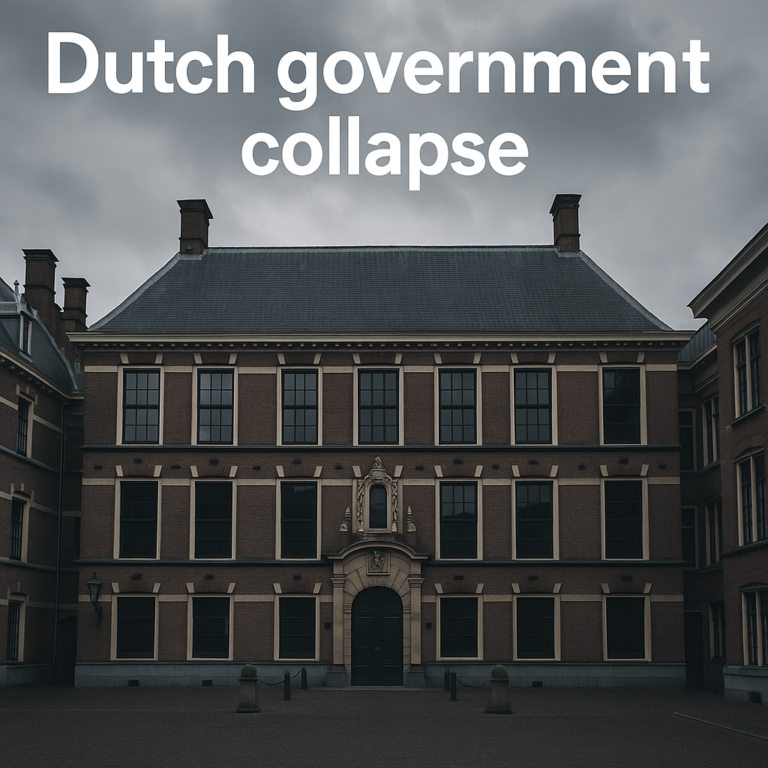
The Dutch government collapse 2025 has unleashed a wave of political turbulence across the Netherlands, following the dramatic withdrawal of far-right leader Geert Wilders from the ruling coalition. After less than a year in power, the fragile alliance that once held the reins of Europe’s most liberal democracy has crumbled, marking a new chapter in Dutch politics driven by immigration tensions and populist ambition.
A Coalition on the Edge Finally Falls: Dutch government collapse 2025
Following the sudden withdrawal of support from the coalition by Geert Wilders, the leader of the far-right Party for Freedom (PVV), Prime Minister Dick Schoof formally resigned on Tuesday. In an emergency televised address, Schoof described the move as “irresponsible and unnecessary,” lamenting the end of what was already a shaky government born from months of post-election negotiation in July 2024.
The final straw? Wilders demanded the implementation of ten new asylum restrictions, including a freeze on refugee applications, halting reception center development, and limiting family reunifications—proposals that were deemed legally unworkable by other coalition members.
Geert Wilders: Political Visionary or National Disruptor?
Geert Wilders, a polarizing figure in Dutch and European politics, wasted no time in turning the crisis into a campaign. Speaking confidently to reporters, he declared his ambition to become Prime Minister of the Netherlands, aiming to make his PVV “stronger than ever” in the next elections.
“This wasn’t about asylum,” argued Dilan Yeşilgöz, leader of the liberal-conservative VVD and a coalition partner. “This was about power.” Mona Keijzer, deputy prime minister from the Farmer-Citizen Movement (BBB), went even further: “Wilders has betrayed the Netherlands.”
Despite the fierce backlash, Wilders appears emboldened, ready to capitalize on growing public frustration around immigration and the cost of living, issues that continue to reshape political landscapes across Europe.
Political Fallout and Economic Implications
Although the cabinet collapse dominated headlines, early analyses suggest limited immediate economic fallout. Sandra Phlippen, chief economist at ABN AMRO Bank, remarked that the outgoing government’s failure to implement substantive policy during its 11-month tenure has muted the financial impact.
However, the long-term uncertainty surrounding leadership, migration policies, and budget planning could affect investor confidence and EU relations, especially with a major NATO summit scheduled later this month in The Hague.
The Elections and Challenges
As per Dutch law, the outgoing government will operate in a caretaker role until fresh elections, expected in autumn 2025. But the path to forming a new majority in the 150-seat Dutch Parliament is far from clear.
Polls show intense competition between far-right, centrist, and green-left parties. Public sentiment remains divided: many support stricter immigration measures, while others fear the erosion of democratic values and humanitarian commitments.
Analysts warn that Wilders’ gamble may not pay off. Despite his party holding the asylum and immigration portfolio for the past year, critics say the PVV failed to deliver meaningful reforms. Voters may question whether collapsing the government over immigration was a political strategy or political sabotage.